Cicadas can make it harder to get things done or enjoy your day. Even if it’s a short period, you need a solution.
To get rid of cicada noise try the following:
- Identify your cicada type.
- Spray water.
- Use vinegar or hot water.
- Turn the soil.
- Prune and protect your plants.
- Avoid gardening during the day.
- Use a pesticide or repellant.
- Try noise-canceling headphones.
How To Silence Cicadas:
If the noise level at your home is close to 100 decibels all day, you’ll need to do something about the cicadas.
Here are some of the best ways for how to make cicadas be quiet and make it through this season.
1. Know Your Cicadas
The first step for learning how to make cicadas be quiet is knowing what you’re dealing with.
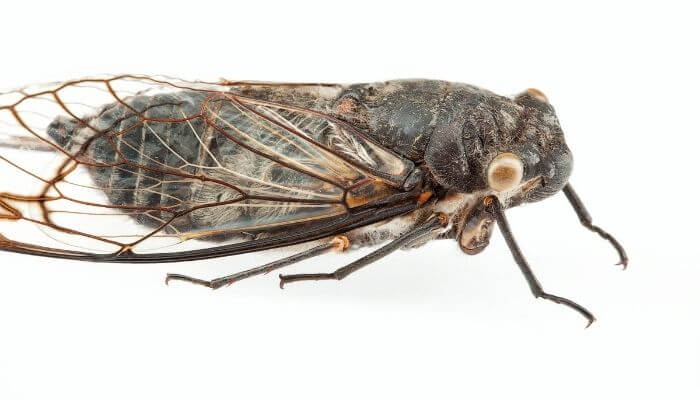
If you’ve just moved into a new place, you might not know whether your cicadas are annual or periodical.
Annual cicadas will appear every summer, but if you’re dealing with a 17-year brood, it might not be worth it to do anything drastic.
They will go away on their own in a short time, and you’ll enjoy 16 summers unbothered by the noise.
You can call a local pest control company or ask your neighbors about the cicada type.
This will help you determine whether you need to act or if it’s worth letting go.
2. Spray Water
Since cicadas love the heat and sunshine, people often find that they get momentary relief from the noise by spraying water on them.
You can make a habit of watering your lawn when the cicada noise gets unbearable.
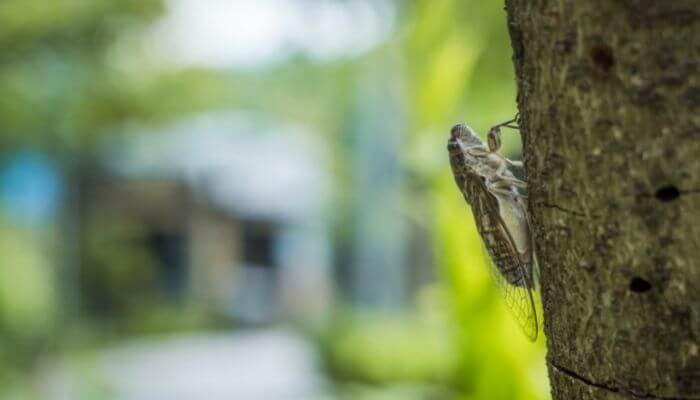
You can also spray water on trees to make them fall down from their preferred spot.
It’s not a permanent solution, but it’s a more eco-friendly one than a pesticide.
3. Pour Vinegar
Applying garden-grade vinegar around the trees and plants where you tend to see cicadas can be helpful for killing off the cicadas and nymphs.
Vinegar is acidic, but it’s not toxic to people or pets, so as soon as it’s dried out, you can let your kids and animals play outside.
Vinegar does have one major negative, that it tends to harm many plants, too.
In some cases, you’ll have to make a choice between noise and killing off a portion of your lawn.
3. Use Boiling Water
Hot water is another safe and pet-friendly way for getting rid of some of the cicadas in their nymph stage.
You’ll need to pour the water into the cicada holes you see around your garden. Use oven mitts and shoes, so you don’t burn yourself when carrying the water.
Also, remember that boiling water might burn your lawn in the treated area, as well.
4. Turn the Soil
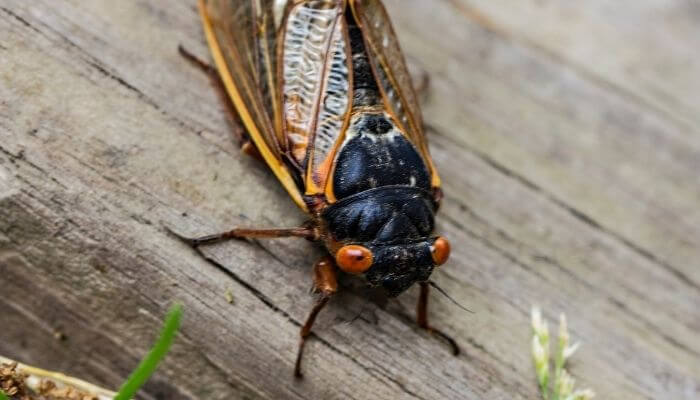
Cicadas like to spend their nymph stage undisturbed in the ground, which is why you don’t usually see them at farms.
During early summer, you can turn the soil often around the trees where you usually hear cicadas.
This can help direct the insects away and help you prevent the noise next year.
5. Prune Your Plants
Pruning your plants will generally help keep cicadas and other insects under control.
With annual cicadas, try to cut off the branches that seem infested with eggs to prevent them from coming back next summer.
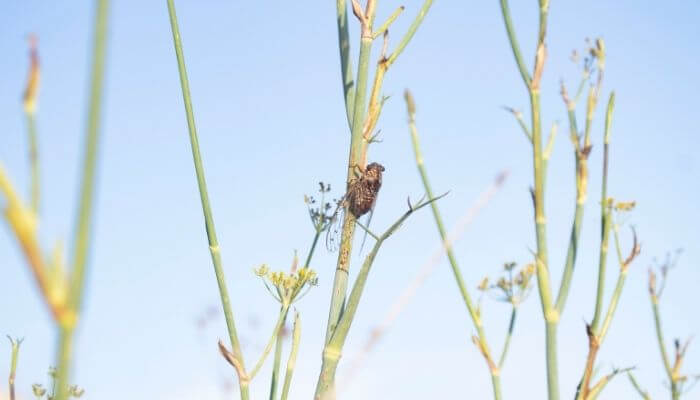
If you’re expecting a large periodical brood of cicadas, don’t plant any new trees or shrubs until fall arrives.
When the female cicada lays its eggs, it makes small slits on the branches, which can damage them.
6. Cover Trees and Shrubs
You can also cover young plants and shrubs with netting to prevent large swarms of cicadas from getting to them.
Wrap sticky paper or foil on your tree trunks to prevent the insects from getting up.
7. Use Gardening Equipment Early
Avoid gardening during the hottest hours of the day.
The noise of a lawnmower or weed whacker can attract cicadas to you since female cicadas can confuse the noise for a male’s mating call.
Cicadas are the most active during the hot afternoon hours, so it’s best to leave mowing grass to early mornings or the evening.
8. Consider Pesticides or Repellants
Killing cicadas isn’t usually necessary since these insects only live for a few weeks to a month at a time. This is especially the case if the cicada noise is only an issue every 13 or 17 years.
However, if you have to live through constant high volumes, an insecticide may be the only option to keep your sanity.
A general insecticide for trees and shrubs can do the trick.
Just remember that some pesticides can be harmful to your plants or pets, as well. Migrating cicada populations can also move to your garden from a neighboring area, so an insecticide might not be a permanent answer.
There are some natural options like peppermint oil that can kill and repel cicadas.
The strong scent of peppermint might also help you keep other insects away.
9. Noise-Canceling Headphones
In some cases, you won’t be able to get rid of your cicadas completely.
Investing in some quality noise-canceling headphones is key to protecting your hearing and sanity.
Also Read: How To Get Rid Of Cricket Noise At Night
What Are Cicadas?
Cicadas are a flying insect that is spread around most of the United States and appears in the spring or summer months.
Depending on where you live, the cicada season can last only a few weeks or the entire summer, from June to August.
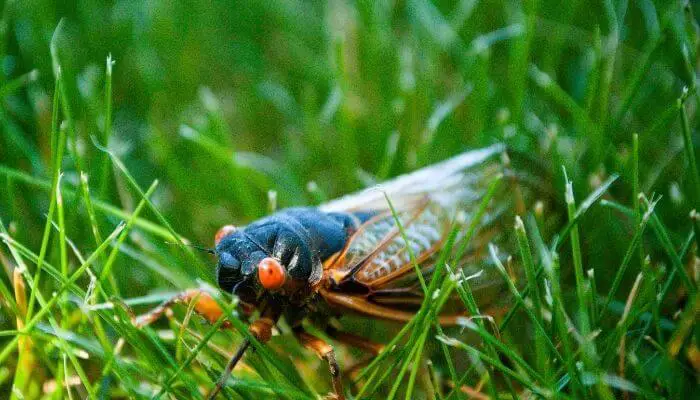
Adult cicadas feed on sap, and females lay their eggs on young tree branches. Cicadas spend their nymph stage in the ground before shedding their shells and heading back up the trees.
Some broods of periodic cicadas have a life cycle of 13 or 17 years, but they spend most of it underground. They only appear for a couple of weeks, but by the millions, which can really disturb your life.
Why Do Cicadas Make Noise?
Cicadas have hardened membranes called tymbals, which make the sound. Most of the rest of their bodies are actually in large part filled with air to resonate that sound, a little like a tiny guitar.
Only male cicadas make this noise, and they use it to attract females. All species have their characteristic sound, and some are louder than others.
Are Cicadas Harmful?
Cicadas are harmless bugs that don’t represent any danger to you or your family, but they are noisy. Some species can reach around 100 decibels, high enough to worsen tinnitus or cause hearing loss.
Apart from their loudness, cicadas aren’t much of a nuisance. They don’t bite or sting humans or animals, and they don’t reproduce indoors.
You might get a couple of them flying in accidentally through open doors or windows, but you don’t have to worry about them nesting inside.
Some cats and dogs will also hunt cicadas. It’s not necessarily dangerous to them unless they eat too many or get cicada wings stuck in their throats.
Cicadas also don’t usually destroy your trees or other plants. However, if your area is seeing a large brood of cicadas, it’s useful to cover younger trees as the females lay their eggs on them.
The Bottom Line
Cicadas can be a real pain, especially if you’re dealing with them every year. The noise they make, not to mention the shells and skins they leave behind, is annoying.
The most important thing to start with is identifying your cicada problem.
Do you just have a periodical brood of cicadas for a couple of weeks every 17 years?
You might best handle it with some quality headphones and spraying some water on them when they get loud.
If you have a yearly cicada problem, you’ll need a real strategy.
There are several ways you can repel or kill cicadas to get some peace and quiet. Try the ones on our list, and let us know which ones worked!
As an Amazon Associate I may earn a small fee from qualifying purchases at no extra cost to you. This helps us run the site, so thanks for your support!
